Applications for the next cohort are currently closed
What is the Food Waste Business Challenge?
The Office of Sustainability’s (OOS) Food Waste Business Challenge was a new pilot program that aimed to engage a minimum of 10 Philadelphia businesses in pursuing new wasted food prevention and recycling programs. The participating businesses worked directly with the Center for EcoTechnology (CET) to identify how and when food waste is created, identify goals to target this waste, and implement a comprehensive strategy to reduce, repurpose, and divert wasted food. CET focuses on a holistic approach and targets both pre-consumer and post-consumer food waste.
By implementing strategies across the U.S. EPA’s Food Recovery Hierarchy, businesses can save money on food purchasing and disposal costs, thus yielding essential economic benefits. Example strategies include implementing source separation and composting, commencing food donation, offering flexible portion sizes, utilizing food parts that would otherwise go unused, making free bread and chips optional. OOS actively promoted the campaign and its participants, which elevated city-wide awareness of the food waste challenge, attracted more participation, and amplified the impacts of any individual instance of technical assistance. The selected businesses collaborated directly with OOS and CET for a minimum of 6 months.
Why did the City coordinate this challenge?
This is a unique opportunity for local food businesses and the City to collaborate towards achieving Zero Food Waste, and for businesses to offer critical feedback to the City that will shape sustainability programs and policy down the line. OOS wanted to learn directly from businesses about their barriers to implementing Zero Food Waste strategies, as well as other challenges they may face, to thrive as a sustainable food business in Philadelphia. CET is a longstanding partner of the City’s; thanks to a grant from the USDA, and were able to connect their expertise with businesses that may have otherwise never accessed this type of 1-1 technical assistance.
How did businesses participate?
Applications were reviewed and selected for a broad range of participants, taking into account factors such as business type, ownership models, and diversity. Selected applicants received no-cost wasted food expertise from the Center for EcoTechnology (CET), including a virtual or in-person site visit to understand a business’s needs, priorities, and opportunities by observing existing practices, assessing waste streams, and analyzing waste bills and other relevant data.
Following this visit, CET staff worked with each participating business to choose and implement three food waste source reduction and diversion strategies that had the greatest promise to yield economic, environmental, and/or social benefits for the business and the Philadelphia community at large. Over the course of the Challenge, CET staff worked with business contacts to support selected strategies and develop tracking and reporting procedures for the Food Waste Business Challenge.
How did participating businesses benefit from this project?
Among many benefits, participating businesses received public recognition from the City of Philadelphia’s Office of Sustainability for their role in the challenge. Additionally, participants received no-cost direct wasted food expertise to support efforts to reduce waste, costs, and environmental impacts.
What did this cost businesses?
Assistance from this challenge was offered to businesses free of charge, thanks to support from OOS and the USDA. Participating businesses received suggestions that may incur additional costs, such as adding organics collection services. CET staff are available to support participating entities in implementing the most cost-effective programs, based on their needs.
Who else has undergone this challenge?
Through its Food Matters Regional Initiative, the NRDC has developed the framework for similar challenges that have been hosted elsewhere, including Nashville, TN, which offered a Food Saver Challenge, and Denver, Colorado’s Food Matters Restaurant Challenge.
Who was involved in coordinating this challenge?
The City of Philadelphia’s Food Service Business Challenge has been made possible with collaboration from numerous partners. The OOS launched this program with support from CET, who brings decades of experience in wasted food solutions. This project was also supported by the NRDC’s Food Matters Regional Initiative, which has developed the framework for similar challenges that have been hosted elsewhere. This project was also made possible by funding from USDA.
Meet Our Participants!
Weavers Way Coop
Weavers Way Co-op is well known locally for its bulk bin and reusable container offerings. Under Philadelphia health code, it is 100% safe and legal for businesses to provide reusable containers to customers!
With two locations in Philadelphia County, Weavers Way Co-op is proudly participating in the Food Waste Business Challenge. As part of its commitment to waste reduction, the co-op encourages customers to reuse boxes instead of shopping bags, giving them a second life before they are recycled. This simple yet effective initiative helps minimize waste and promote a more sustainable shopping experience.
Weavers Way Coop
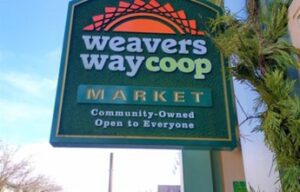
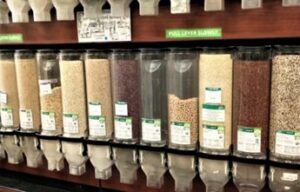
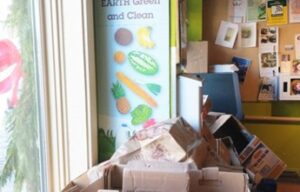
Weckerly’s ice cream
The CET consultants met with Weckerly’s Ice Cream co-owner, Andy, at their production kitchen in Northeast Philly to explore ways to minimize waste.
Weckerly’s takes a sustainable approach by having their milk and cream delivered in reusable metal milk urns. These old-fashioned containers might seem nostalgic, but they significantly reduce packaging waste!
Famous for their ice cream sandwiches, Weckerly’s occasionally encounters production waste. As part of the Food Waste Business Challenge, they’ll be working on innovative solutions to repurpose and minimize waste—keeping sustainability at the heart of their process.
Weckerly’s
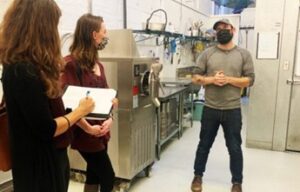
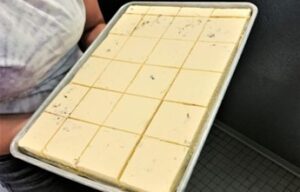
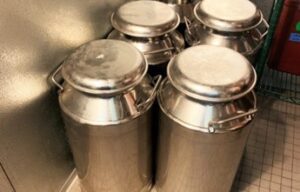
The Random tea room
At The Random Tea Room, sustainability is at the core of their business. They package their tea in reusable metal containers, reducing unnecessary waste while maintaining freshness.
As part of the Food Waste Business Challenge, owner Rebecca met with a CET consultant to discuss their goals and explore new ways to enhance their sustainability efforts.
To further encourage waste reduction, The Random Tea Room offers discounts to guests who bring their own reusable containers—a simple yet impactful way to promote sustainability in the community!
The random tea Room & Curiosity Shop
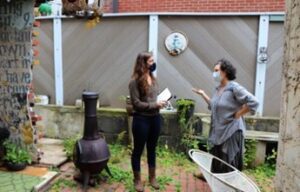
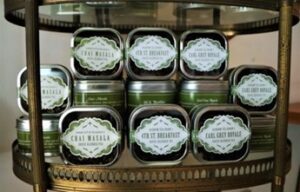

Relish
Relish, a beloved Philly restaurant, is no stranger to food waste reduction. They have strong food donation partnerships across the city, ensuring surplus food benefits the community instead of going to waste.
As part of the Food Waste Business Challenge, Relish is bringing back fan-favorite, food-waste-fighting casseroles—creative dishes inspired by leftover ingredients in the kitchen. By turning surplus food into delicious meals, Relish continues to lead by example in sustainability and waste reduction.
Relish


Musi BYOB
At Musi BYOB, food waste prevention starts with meticulous organization—their fridges are carefully arranged to ensure every ingredient is used efficiently, minimizing unnecessary waste.
Taking sustainability a step further, Musi dehydrates onion skins to create their own house-made onion powder, transforming what would be waste into a flavorful ingredient.
As part of the Food Waste Business Challenge, CET consultants met with Musi BYOB chef, Nora, to learn more about their innovative, waste-eliminating practices and explore new strategies to further reduce food waste.
MUSI
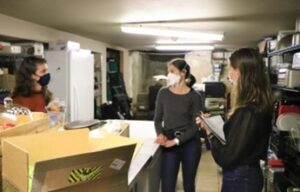
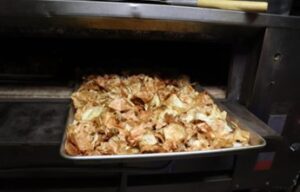
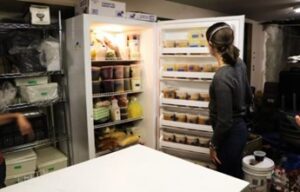
Earth – Bread + Brewery
At Earth – Bread + Brewery, sustainability is part of the process from start to finish. They brew their own beer in-house and then compost the spent grain in partnership with Saul High School’s agricultural program, ensuring that nothing goes to waste.
Even their wood-fired pizza oven contributes to sustainability—the wood ash it produces can be composted, turning a byproduct into a valuable resource.
Through these innovative waste-reduction efforts, Earth – Bread + Brewery continues to set an example for environmentally conscious food and beverage businesses.
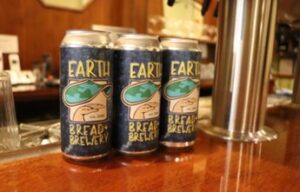
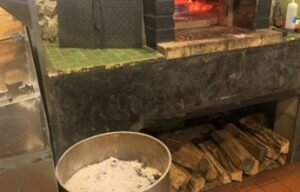
Birchtree Catering
As one of only two catering companies participating in the Food Waste Business Challenge, Birchtree Catering is committed to sustainable food practices without compromising creativity or quality.
Their chefs work one-on-one with CET technical consultants to refine their waste reduction strategies and implement eco-friendly solutions.
Birchtree Catering also proves that sustainability can be both fun and brand-aligned—they even serve drinks with paper straws designed to look like birch trees, a clever nod to their name and commitment to reducing plastic waste.
Birchtree Catering
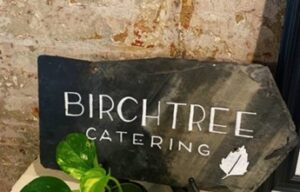
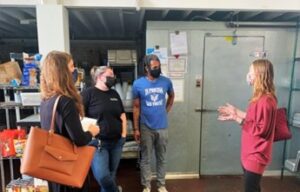

Bar Hygge
Bar Hygge is proudly participating in the Food Waste Business Challenge, alongside its sister restaurant, Earth – Bread + Brewery!
Sustainability is at the heart of Bar Hygge—not just in their food waste reduction efforts, but also in their design. Their warm, inviting space features reclaimed furniture and fixtures, giving new life to materials that might otherwise go to waste.
By embracing both eco-conscious dining and sustainable decor, Bar Hygge proves that sustainability and comfort can go hand in hand.
Bar Hygge
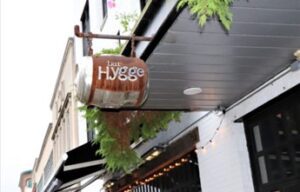

Balboa Catering
At Balboa Catering, sustainability is woven into every aspect of their food preparation. Owner and chef Alex (right) met with Helena (left) from the City of Philadelphia Office of Sustainability to explore new ways to minimize waste.
Balboa Catering utilizes Cryovacing, a technique that preserves food by removing oxygen from storage bags. While many Food Waste Business Challenge participants already use this method, Balboa is taking it a step further by exploring ways to recycle plastic Cryovac bags, preventing them from ending up in landfills.
Additionally, Balboa embraces fermentation and pickling—time-honored preservation techniques that not only extend shelf life but also enhance flavors across a variety of dishes. By blending innovation with tradition, Balboa Catering continues to push the boundaries of sustainable food practices.

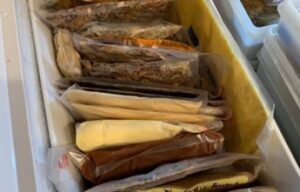
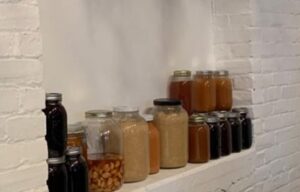
Tools & Resources
- The Food Waste Logbook: the 2022 Food Waste Challengers are using this spreadsheet to keep track of their waste – including food waste, trash, recycling, and more! If you’d like to customize this logbook to suit your business’ needs but aren’t sure how to do this, send us an email (contact information is provided below).
- The Food Waste Logbook Instruction Sheet: the Challengers will be following these guidelines while tracking their waste. Use this instruction sheet to learn how to use the Food Waste Logbook, and to learn more tips about tracking your waste generation.
- Food Waste Challenge Kickoff Call Slide Deck: this presentation contains more information about what participants will be working on as part of the Food Waste Business Challenge, alongside lots of interesting information about Philadelphia’s waste landscape & waste tools for businesses.
- Food Waste Management for Commercial Properties: this 2-page flyer quickly delivers information about food waste rules & regulations for businesses in Philadelphia, and what you can do to more sustainably manage food waste.
- Zero Waste Guide for Foodservice Establishments: if you’re looking for ways to eliminate waste at your food business – from food waste to packaging waste – check this guide out! The guide goes over the basics of food safety and regulations related to waste generation and provides lots of tools and resources to help you build a low-waste foodservice program.
- PolyGreen America and United States Recycling: These plastic recyclers accept most clean rigid plastic containers and clean film plastics. Other recyclers of plastic film can be found on plasticfilmrecycling.org. Typically for small amounts of film plastic, this material can be aggregated and brought to a local grocery store where it is collected and sent to Trex and recycled into composite decking.
More About This Initiative
Additional questions?
Contact the Office of Sustainability at sustainability@phila.gov or helena.rudoff@phila.gov.
This material is based upon work supported under a grant by the Rural Utilities Service, United States Department of Agriculture.
Any opinions, findings, and conclusions or recommendations expressed in this material are the sole responsibilities of the authors and do not necessarily represent the official views of the Rural Utilities Service.
CET is an equal opportunity provider and employer.
Need Free Assistance?
For more than 45 years, CET has helped communities, businesses & Institutions save energy and reduce waste.








